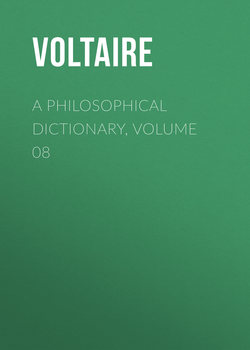Читать книгу A Philosophical Dictionary, Volume 08 - Voltaire, Вольтер - Страница 16
ONAN
ОглавлениеThe race of Onan exhibits great singularities. The patriarch Judah, his father, lay with his daughter-in-law, Tamar the Phœnician, in the highroad; Jacob, the father of Judah, was at the same time married to two sisters, the daughters of an idolater; and deluded both his father and father-in-law. Lot, the granduncle of Jacob, lay with his two daughters. Saleum, one of the descendants of Jacob and of Judah, espoused Rahab the Canaanite, a prostitute. Boaz, son of Saleum and Rahab, received into his bed Ruth the Midianite; and was great grandfather of David. David took away Bathsheba from the warrior Uriah, her husband, and caused him to be slain, that he might be unrestrained in his amour. Lastly, in the two genealogies of Christ, which differ in so many points, but agree in this, we discover that he descended from this tissue of fornication, adultery, and incest.
Nothing is more proper to confound human prudence; to humble our limited minds; and to convince us that the ways of Providence are not like our ways. The reverend father Dom Calmet makes this reflection, in alluding to the incest of Judah with Tamar, and to the sin of Onan, spoken of in the 38th chapter of "Genesis": "Scripture," he observes, "gives us the details of a history, which on the first perusal strikes our minds as not of a nature for edification; but the hidden sense which is shut up in it is as elevated as that of the mere letter appears low to carnal eyes. It is not without good reasons that the Holy Spirit has allowed the histories of Tamar, of Rahab, of Ruth, and of Bathsheba, to form a part of the genealogy of Jesus Christ."
It might have been well if Dom Calmet had explained these sound reasons, by which we might have cleared up the doubts and appeased the scruples of all the honest and timorous souls who are anxious to comprehend how this Supreme Being, the Creator of worlds, could be born in a Jewish village, of a race of plunderers and of prostitutes. This mystery, which is not less inconceivable than other mysteries, was assuredly worthy the explanation of so able a commentator – but to return to our subject.
We perfectly understand the crime of the patriarch Judah, and of the patriarchs Simeon and Levi, his brothers, at Sichem; but it is more difficult to understand the sin of Onan. Judah had married his eldest son Er to the Phœnician, Tamar. Er died in consequence of his wickedness, and the patriarch wished his second son to espouse the widow, according to an ancient law of the Egyptians and Phœnicians, their neighbors, which was called raising up seed for his brother. The first child of this second marriage bore the name of the deceased, and this Onan objected to. He hated the memory of his brother, or to produce a child to bear the name of Er; and to avoid it took the means which are detailed in the chapter of "Genesis" already mentioned, and which are practised by no species of animals but apes and human beings.
An English physician wrote a small volume on this vice, which he called after the name of the patriarch who was guilty of it. M. Tissot, the celebrated physician of Lausanne, also wrote on this subject, in a work much more profound and methodical than the English one. These two works detail the consequences of this unhappy habit – loss of strength, impotence, weakness of the stomach and intestines, tremblings, vertigo, lethargy, and often premature death.
M. Tissot, however, to console us for this evil, relates as many examples of the mischiefs of repletion in both sexes. There cannot be a stronger argument against rash vows of chastity. From the examples afforded, it is impossible to avoid being convinced of the enormous folly of condemning ourselves to these turpitudes in order to renounce a connection which has been expressly commanded by God Himself. In this manner think the Protestants, the Jews, the Mahometans, and many other nations; the Catholics offer other reasons in favor of converts. I shall merely say of the Catholics what Dom Calmet says of the Holy Ghost – That their reasons are doubtless good, could we understand them.
